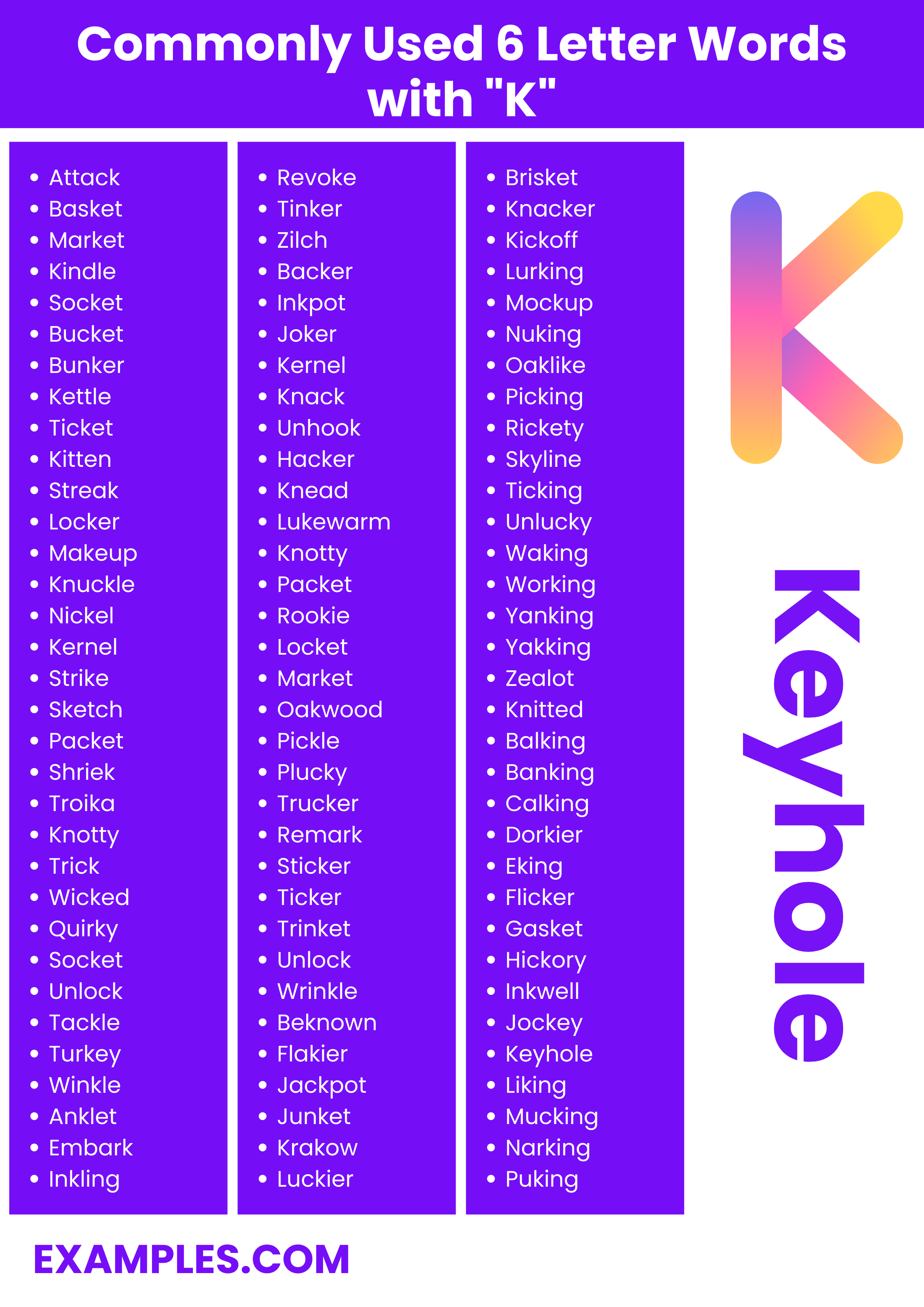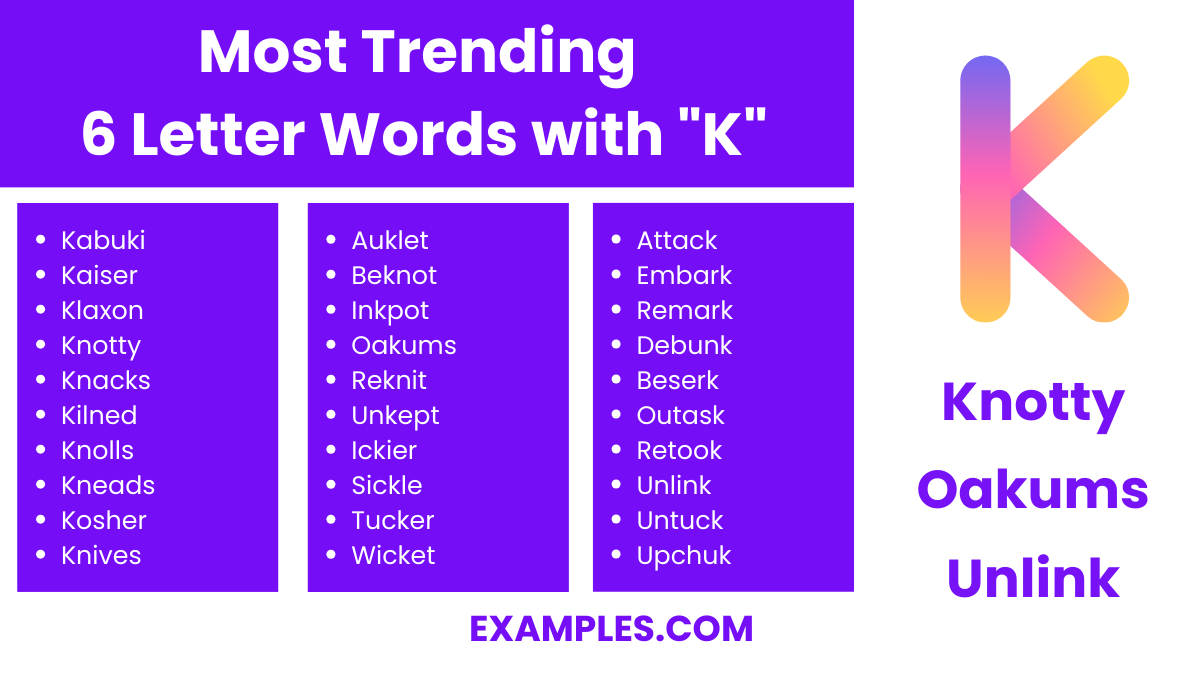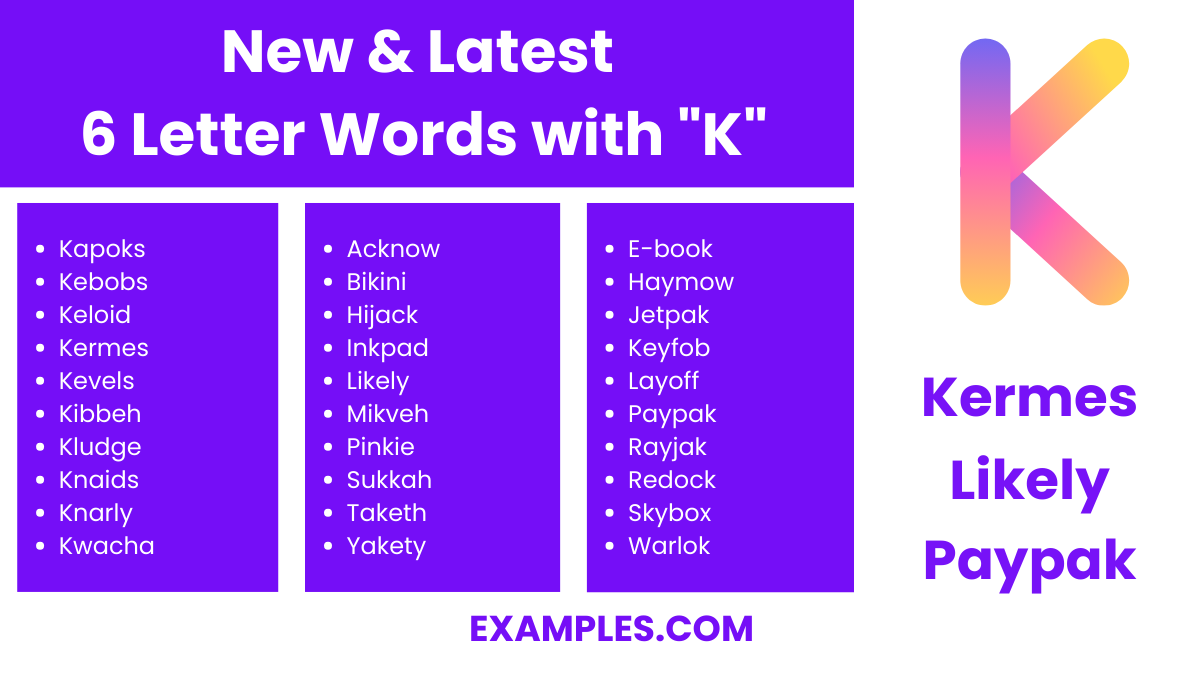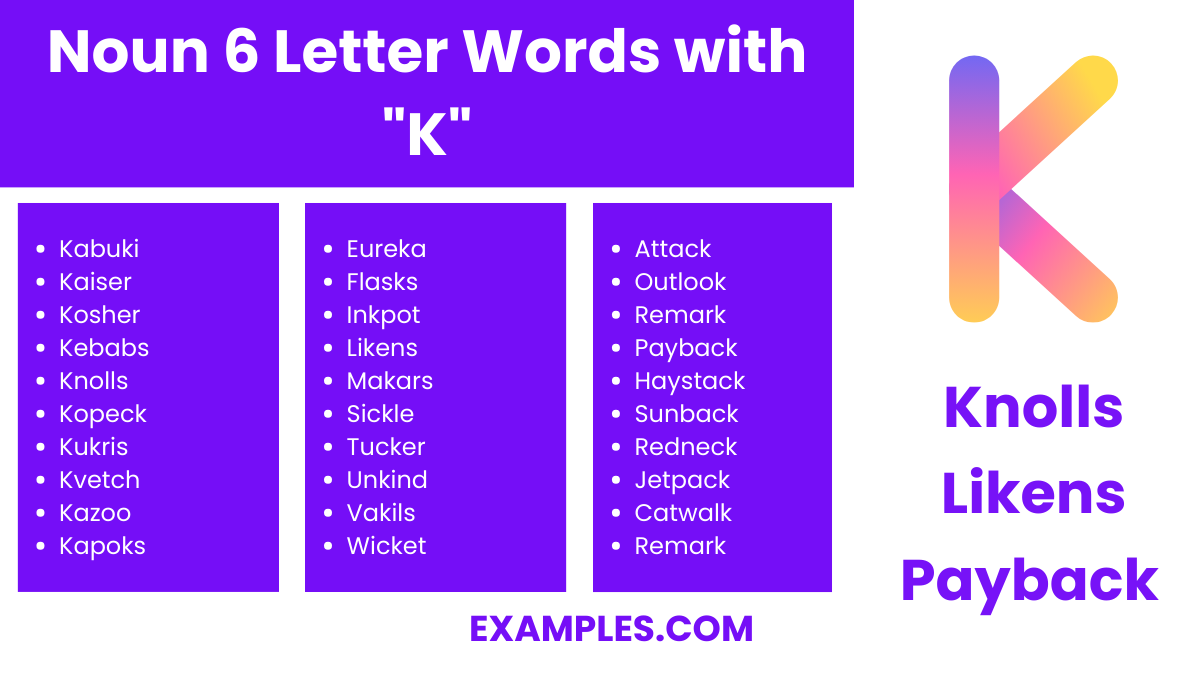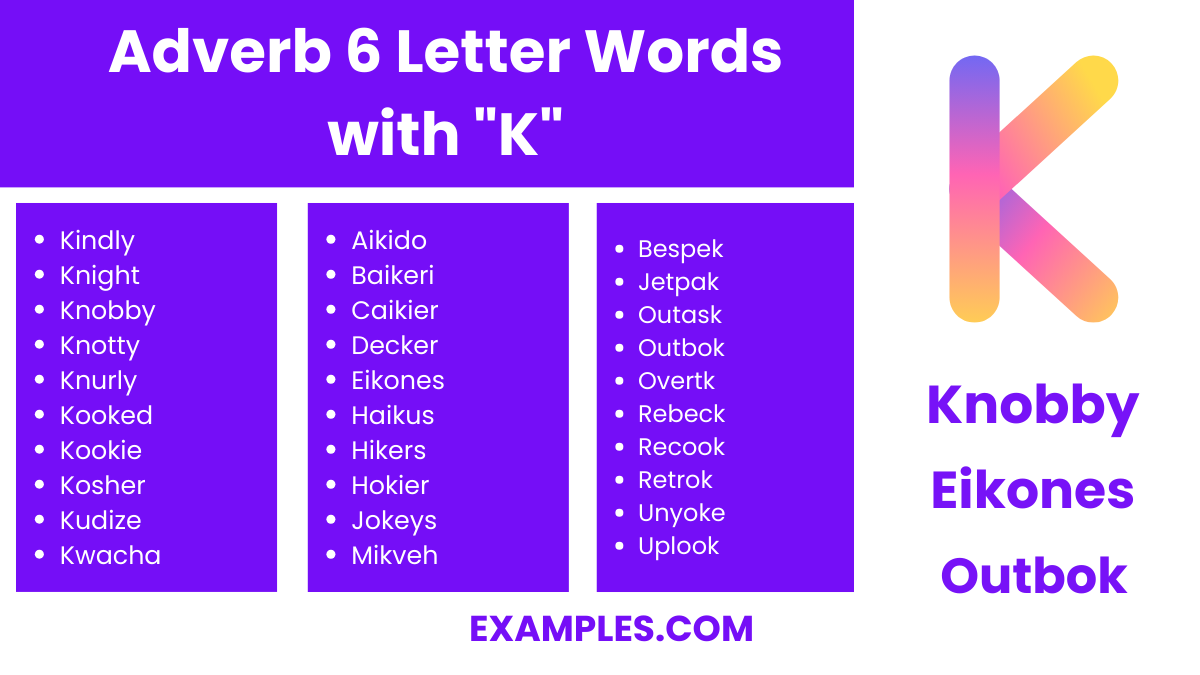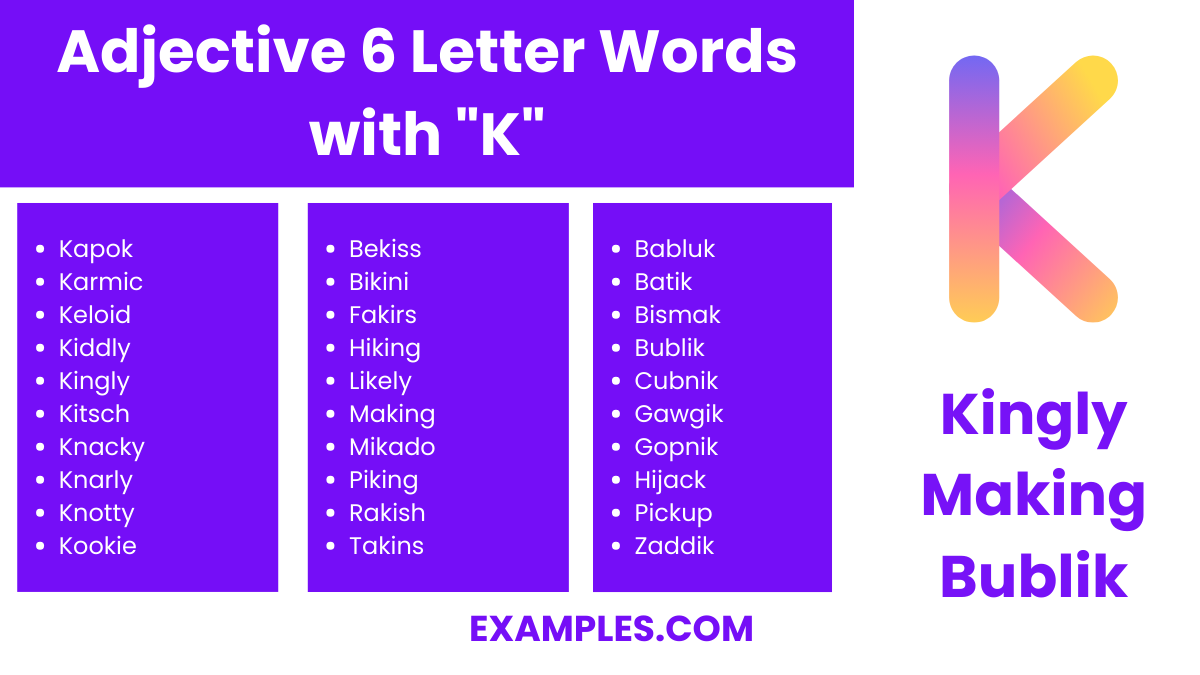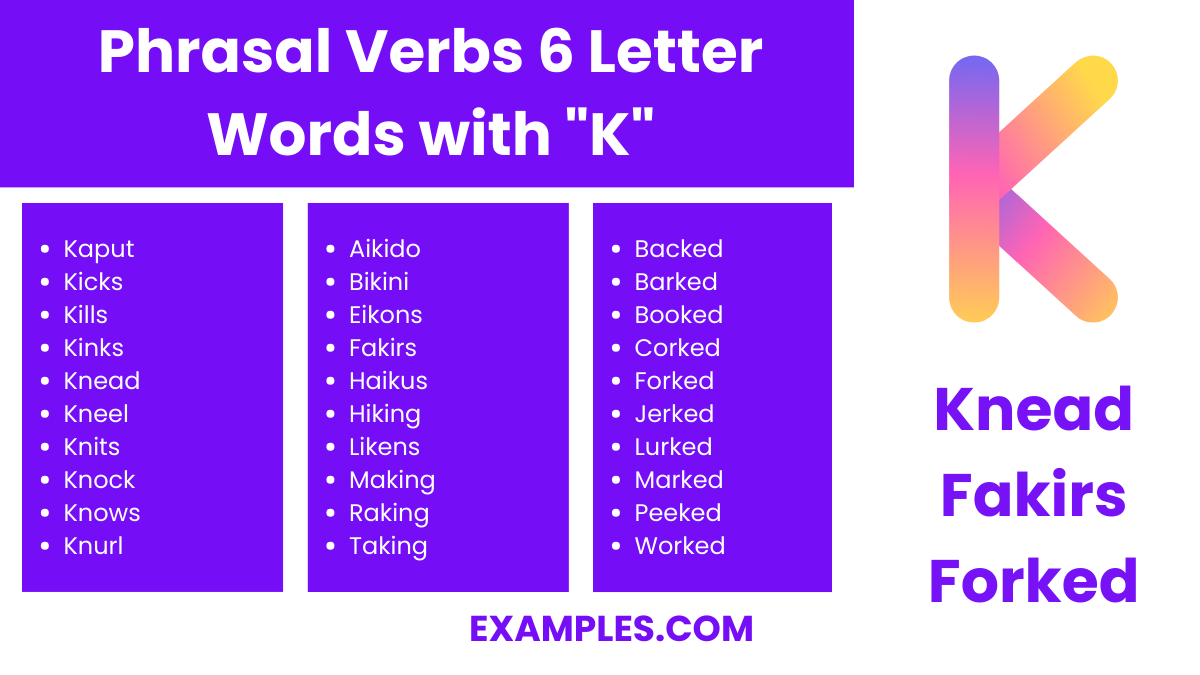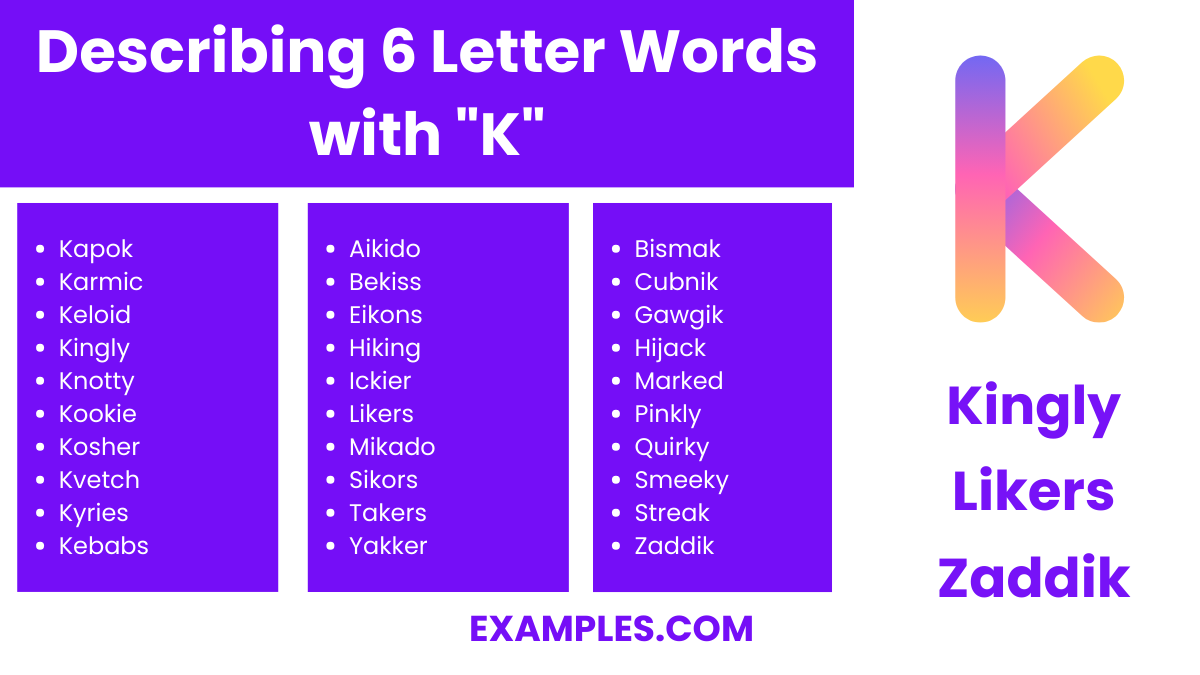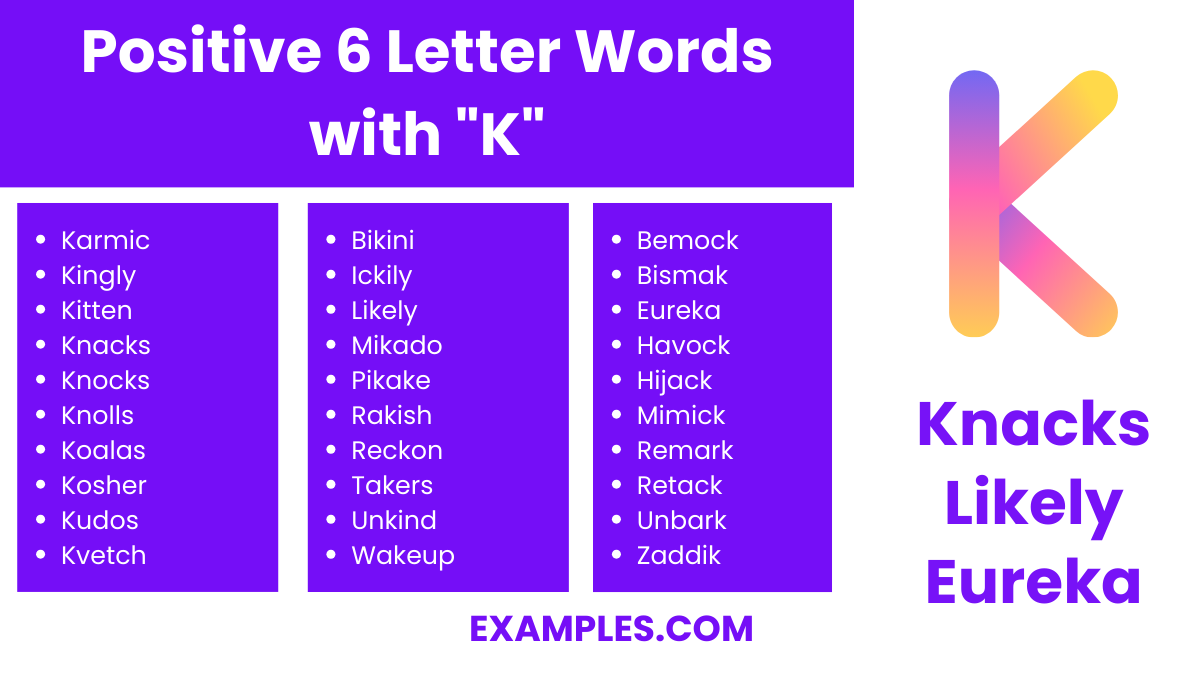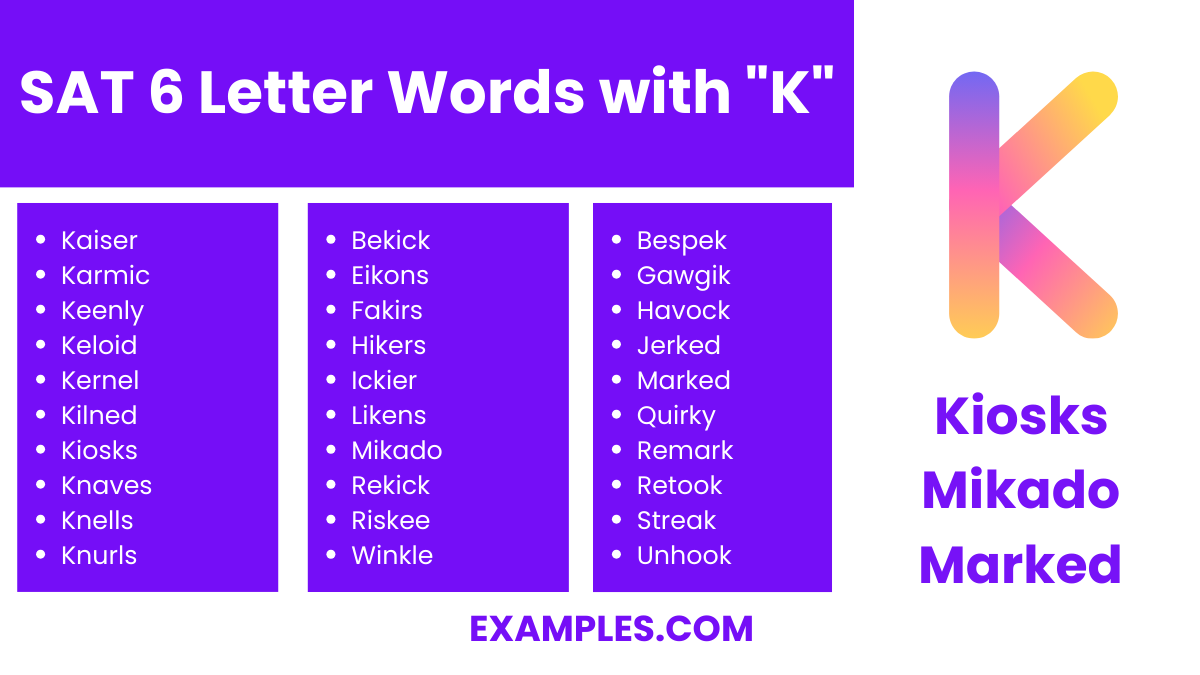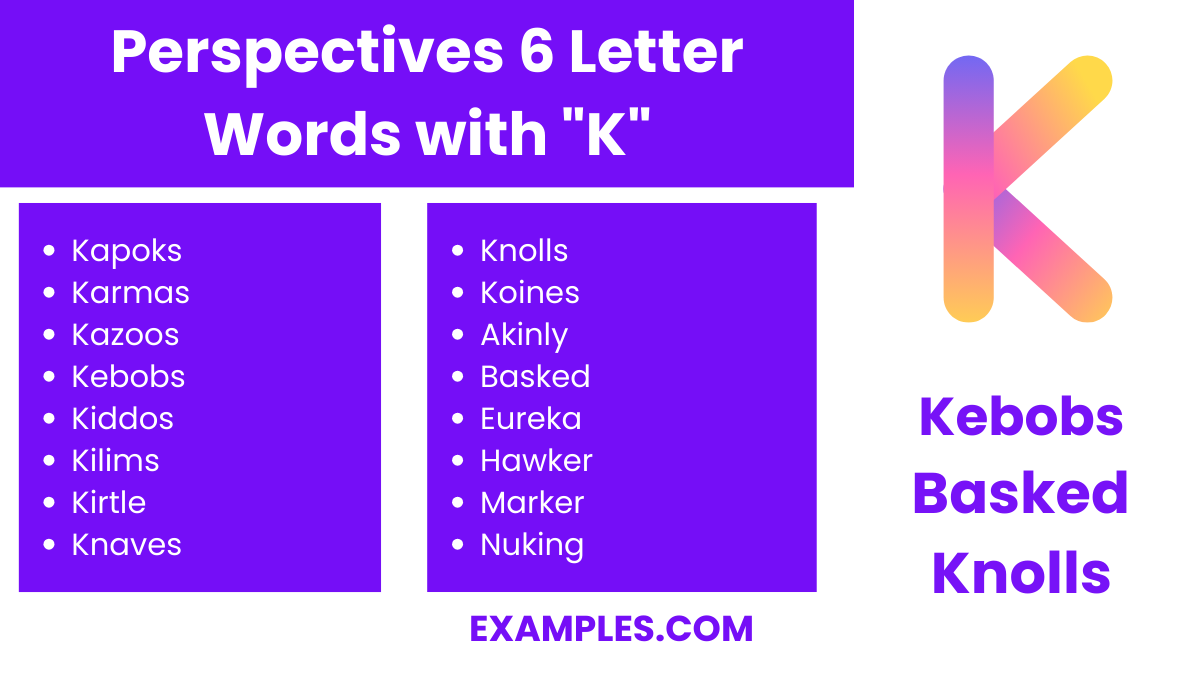450+ 6 Letter Words with K List, Meaning, PDF
As educators, we are always on the lookout for effective ways to enhance our teaching methods and engage our students in the journey of learning. One such method is through the exploration of words, specifically 6-letter words that start with ‘K’. This approach not only introduces students to new vocabulary but also helps them understand word formations and usage in different contexts. Words like ‘Kidnap’, ‘Kilned’, and ‘Kosher’ are not just vocabulary terms; they are gateways to understanding culture, history, and nuances of the English language.
Download Most Commonly Used 6 Letter Words with K - PDF
300+ Most Commonly Used 6 Letter Words with “K”
Six-letter words containing “K” are often versatile and add a touch of intrigue to the English language. These words encompass various aspects of life, from everyday activities to specialized fields. They can evoke a sense of action, innovation, or surprise. In this list, you’ll find a diverse selection of commonly used 6-letter words with “K,” each with its own unique meaning and application, enriching our language and communication.
| Attack | Basket | Market | Kindle | Socket | Bucket |
| Bunker | Kettle | Ticket | Kitten | Streak | Locker |
| Makeup | Knuckle | Nickel | Kernel | Strike | Sketch |
| Packet | Shriek | Troika | Knotty | Trick | Wicked |
| Quirky | Socket | Unlock | Tackle | Turkey | Winkle |
| Anklet | Embark | Inkling | Revoke | Tinker | Zilch |
| Backer | Inkpot | Joker | Kernel | Knack | Unhook |
| Hacker | Knead | Lukewarm | Knotty | Packet | Rookie |
| Locket | Market | Oakwood | Pickle | Plucky | Trucker |
| Remark | Sticker | Ticker | Trinket | Unlock | Wrinkle |
| Beknown | Flakier | Jackpot | Junket | Krakow | Luckier |
| Brisket | Knacker | Kickoff | Lurking | Mockup | Nuking |
| Oaklike | Picking | Rickety | Skyline | Ticking | Unlucky |
| Waking | Working | Yanking | Yakking | Zealot | Knitted |
| Balking | Banking | Calking | Dorkier | Eking | Flicker |
| Gasket | Hickory | Inkwell | Jockey | Keyhole | Liking |
| Mucking | Narking | Puking | Quaking | Racking | Sacking |
| Tacking | Uptake | Vodka | Wackier | Yacking | Zonking |
| Booking | Casket | Dusking | Earlock | Flaking | Gherkin |
| Hackney | Inkbolt | Jockeys | Knapped | Lurkers | Mockery |
| Necktie | Oaken | Peeking | Quirked | Reeked | Suckers |
| Tinkled | Unkempt | Viscera | Whiskey | Yolks | Zinkify |
| Bekissed | Bunkered | Choking | Decking | Dunking | Embanks |
| Flicking | Gaskets | Hankered | Invoked | Jockeyed | Knickers |
| Leaking | Mocking | Necking | Plonking | Quakers | Reeking |
| Smoking | Trinkets | Unkinder | Wrinkled | Yacking | Zinkifer |
| Knobbly | Knacker | Knitted | Knack | Knicker | Knocker |
| Knotted | Knuckle | Keeking | Kicking | Kinkier | Kookier |
| Koshers | Ketchup | Kingpin | Kinsmen | Kitschy | Klutzes |
| Knockout | Knockers | Knitting | Knight | Knapped | Knowled |
| Knowns | Knurled | Kokanee | Kowtow | Koalas | Knotted |
| Knack | Kneel | Knock | Knurl | Kiosk | Knelt |
| Krill | Knout | Klutz | Knits | Knobs | Kenaf |
| Kernel | Keypad | Kicked | Knack | Keeps | Kiosk |
| Kapok | Krone | Knead | Kayak | Karma | Kebab |
| Kudos | Kudos | Knish | Kvass | Knoll | Known |
| Koala | Knish | Kopeck | Kettle | Knotty | Kebob |
| Kipper | Kvetch | Kettle | Kneel | Knaid | Knish |
| Kebab | Kicky | Kurta | Kappa | Kilos | Kinks |
| Knock | Knees | Kebab | Kidnap | Kidney | Kicker |
| Kilted | Kilned | Keptin | Kudzus | Kurves | Kneel |
| Knees | Knout | Kudos | Kvetch | Kiddo | Knoll |
| Kooky | Kismet | Knout | Kooky | Kudos | Kibitz |
| Kaiser | Keptin | Kidnap | Knaid | Kegler | Kudzus |
| Kernel | Kapok | Kernel | Knout | Knish | Kiddo |
| Kismet | Kiosk | Kinks | Knaid | Knout | Kidnap |
Most Trending 6 Letter Words with “K”
In today’s dynamic linguistic landscape, certain six-letter words with the letter ‘K’ have surged in popularity. These words, rich in both phonetic appeal and semantic depth, are increasingly being used in various contexts – from academic discussions to social media. This trend reflects an evolving vocabulary that is both engaging and informative, catering to the needs of educators and learners alike. Here, we present a curated list of the most trending six-letter words with ‘K’, categorized by their placement in the word. Each word is followed by a brief definition, aiding teachers in expanding the lexical range of their students.
- Kabuki – A traditional Japanese drama with song and dance.
- Kaiser – A title for an emperor in Germany.
- Klaxon – A loud electric horn.
- Knotty – Complicated or difficult to solve.
- Knacks – Special talents or skills.
- Kilned – Dried or baked in a kiln.
- Knolls – Small, rounded hills.
- Kneads – Works dough or clay with hands.
- Kosher – Fit or allowed to be eaten or used, according to Jewish law.
- Knives – Cutting instruments with a blade and handle.
- Auklet – A small seabird.
- Beknot – To tie or bind with knots.
- Inkpot – A small jar or pot for ink.
- Oakums – Loosely twisted hemp or jute fiber used in caulking.
- Reknit – To knit something again or differently.
- Unkept – Not maintained; neglected.
- Ickier – More unpleasant or distasteful.
- Sickle – A tool with a curved blade for cutting crops.
- Tucker – To tire or exhaust.
- Wicket – A small gate or door.
- Attack – To act aggressively against.
- Embark – To go on board a ship or aircraft.
- Remark – To say or write as a comment.
- Debunk – To expose the falseness of a myth, idea, or belief.
- Beserk – Out of control with anger or excitement; wild or frenzied.
- Outask – To surpass in tasking or challenging.
- Retook – Took back or repossessed.
- Unlink – To disconnect or detach.
- Untuck – To loosen or release from a tucked position.
- Upchuk – To vomit or throw up.
New & Latest Added 6 Letter Words with “K”
The English language continually evolves, and with this evolution comes the addition of new and intriguing words. Recently, several six-letter words containing the letter ‘K’ have been introduced into the lexicon. These words, a blend of modernity and linguistic innovation, are becoming increasingly relevant in contemporary discourse. For educators, these words offer fresh material to enrich the vocabulary of students. Below is a selection of these new additions, organized by the position of ‘K’ in the word, each accompanied by a succinct definition.
- Kapoks – A tropical tree with lightweight seeds.
- Kebobs – Dishes of small pieces of meat or vegetables grilled on a skewer.
- Keloid – A raised scar after an injury has healed.
- Kermes – A red dye made from a type of insect.
- Kevels – Large cleats on a ship for securing ropes.
- Kibbeh – A Middle Eastern dish made of bulgur, minced onions, and ground meat.
- Kludge – A clumsy or inelegant solution to a problem.
- Knaids – Struggles or difficulties (slang or dialectal).
- Knarly – Having knars; gnarled.
- Kwacha – The currency of Zambia and Malawi.
- Acknow – To acknowledge or admit.
- Bikini – A two-piece swimsuit for women.
- Hijack – To seize control of a vehicle unlawfully.
- Inkpad – A pad soaked in ink for stamping.
- Likely – Probable or expected.
- Mikveh – A bath used for ritual immersion in Judaism.
- Pinkie – The little finger.
- Sukkah – A temporary shelter covered in natural materials, used during the Jewish festival of Sukkot.
- Taketh – Archaic or biblical form of ‘takes’.
- Yakety – Talkative; chatty.
- E-book – A digital version of a printed book.
- Haymow – A stack of hay stored in a barn.
- Jetpak – A portable jet propulsion system for individual use (modern slang).
- Keyfob – A small electronic device used for remote controlling.
- Layoff – A temporary or permanent dismissal from employment.
- Paypak – A method of packaging payment or financial transactions (modern slang).
- Rayjak – An invented or obscure word.
- Redock – To dock again or reconnect.
- Skybox – A private seating area in a stadium.
- Warlok – An alternative spelling for ‘warlock’, a male witch.
Noun 6 Letter Words with “K”
In the realm of English vocabulary, nouns form the cornerstone of language learning. Among these, six-letter nouns containing the letter ‘K’ are particularly interesting, offering a mix of familiar and novel concepts. For educators looking to enrich their students’ vocabulary, these nouns present a unique opportunity. Below is a list of such nouns, sorted according to the placement of ‘K’ in the word, complete with concise definitions for easy comprehension.
- Kabuki – A traditional Japanese theatrical form.
- Kaiser – A German emperor.
- Kosher – Food that conforms to Jewish dietary law.
- Kebabs – Pieces of meat grilled on a skewer.
- Knolls – Small, rounded hills.
- Kopeck – A Russian monetary unit.
- Kukris – Nepalese knives with a curved blade.
- Kvetch – A person who complains a great deal.
- Kazoo – A musical instrument that adds a buzzing sound to a player’s voice.
- Kapoks – Tropical trees with buoyant seeds.
- Eureka – An exclamation of triumph at a discovery.
- Flasks – Small containers for liquids.
- Inkpot – A small container for ink.
- Likens – Compares, finds similarities.
- Makars – Poets, especially Scottish ones.
- Sickle – A hand-held agricultural tool with a curved blade.
- Tucker – Food or provisions.
- Unkind – Lacking kindness; harsh.
- Vakils – Lawyers or advocates in India.
- Wicket – A small gate or a set of stumps in cricket.
- Attack – An aggressive action against someone or something.
- Outlook – A person’s point of view or general attitude to life.
- Remark – A spoken or written observation.
- Payback – The act of revenge or recompense.
- Haystack – A large pile or stack of hay.
- Sunback – The part of an object that receives sunlight.
- Redneck – A derogatory term for a rural poor white person in the US.
- Jetpack – A jet propulsion pack for personal use.
- Catwalk – A narrow, elevated walkway.
- Remark – A comment or observation.
Adverb 6 Letter Words with “K”
In the realm of English language learning, especially for students aiming to enhance their vocabulary and communication skills, the exploration of six-letter adverbs containing the letter ‘K’ is a valuable exercise. Adverbs, as we know, modify verbs, adjectives, or other adverbs, often providing crucial information about the manner, place, time, frequency, or degree of an action or condition. Teachers, while facilitating learning, can greatly benefit from this list, using it as a resource to enrich lesson plans and engage students in language exercises. Let’s delve into various six-letter adverbs with ‘K’, categorized by their position in the word.
- Kindly – in a kind manner
- Knight – in the manner of a knight
- Knobby – having knobs
- Knotty – full of knots
- Knurly – full of knurls or knots
- Kooked – (Slang) acted in a crazy or eccentric manner
- Kookie – (Slang) in a crazy or eccentric manner
- Kosher – in a manner conforming to Jewish dietary laws
- Kudize – to praise or honor
- Kwacha – unit of currency in Malawi and Zambia
- Aikido – relating to the Japanese martial art of Aikido
- Baikeri – in a biker manner or style
- Caikier – (Scottish) in a frolicsome manner
- Decker – relating to the deck of a ship
- Eikones – in the style of icons or images
- Haikus – in the style of Haiku poetry
- Hikers – related to hiking
- Hokier – more contrived or artificial
- Jokeys – in a joking manner
- Mikveh – relating to the Jewish ritual bath
- Bespek – in a bespectacled manner
- Jetpak – with a jet pack
- Outask – to surpass in asking
- Outbok – to surpass in boking
- Overtk – to overtake
- Rebeck – in the manner of a rebeck (a musical instrument)
- Recook – to cook again
- Retrok – in a retroactive manner
- Unyoke – to unyoke or free
- Uplook – to look upwards
Adjective 6 Letter Words with “K”
When teaching students about adjectives, it’s essential to focus on their role in describing or modifying nouns. Six-letter adjectives containing the letter ‘K’ offer a unique set of words that can enrich students’ vocabulary. These words can be instrumental in improving both their written and spoken English skills. This exploration will provide teachers with a diverse set of adjectives to incorporate into teaching materials, enhancing the learning experience for students.
- Kapok – made of silky fibers from the kapok tree
- Karmic – relating to karma
- Keloid – relating to keloids (type of scar)
- Kiddly – resembling or characteristic of kids (children)
- Kingly – having the characteristics of a king
- Kitsch – considered to be in poor taste but appreciated in an ironic way
- Knacky – clever or skillful
- Knarly – having knars or knots
- Knotty – full of knots; complicated
- Kookie – crazy or eccentric (Slang)
- Bekiss – given to kissing
- Bikini – relating to a bikini
- Fakirs – relating to fakirs (Muslim or Hindu ascetics)
- Hiking – suitable for hiking
- Likely – probably or plausible
- Making – related to the act of making
- Mikado – relating to the Mikado (the emperor of Japan)
- Piking – of or related to pike fishing
- Rakish – having a dashing, jaunty, or slightly disreputable quality
- Takins – related to the takin (a gnu goat)
- Babluk – (Ukrainian) babbling or incoherent
- Batik – using or related to batik (a method of dyeing fabric)
- Bismak – containing bismuth
- Bublik – resembling a Russian bagel
- Cubnik – resembling a cube
- Gawgik – resembling a gawk
- Gopnik – relating to a gopnik (a type of Russian subculture)
- Hijack – prone to hijacking
- Pickup – suitable for picking up or being picked up
- Zaddik – righteous, virtuous (in Jewish tradition)
Phrasal Verbs 6 Letter Words with “K”
Phrasal verbs, a combination of a verb and a preposition or adverb, are integral in mastering conversational English. They often carry meanings that are not directly inferable from the individual words, making them a unique challenge for learners. Teachers can use this list of six-letter phrasal verbs containing ‘K’ to enhance students’ understanding and use of these expressions in both spoken and written English.
- Kaput – to cease functioning; break down
- Kicks – to express enjoyment or excitement
- Kills – to cause something to stop or die
- Kinks – to form or cause a twist or curl
- Knead – to work dough or clay
- Kneel – to bend the knee, usually in submission or reverence
- Knits – to unite or bring together
- Knock – to rap or hit
- Knows – to have knowledge or understanding
- Knurl – to make a small, raised ridge on a surface
- Aikido – to practice Aikido (a martial art)
- Bikini – to wear a bikini
- Eikons – to create an icon or image
- Fakirs – to act as a fakir (ascetic)
- Haikus – to write or recite Haiku poetry
- Hiking – to walk or trek, usually in nature
- Likens – to compare or make similar
- Making – to create or produce
- Raking – to gather or collect with a rake
- Taking – to seize or capture
- Backed – to support or endorse
- Barked – to emit a bark-like sound
- Booked – to reserve or schedule
- Corked – to seal with a cork
- Forked – to divide into two or more branches
- Jerked – to move suddenly and sharply
- Lurked – to remain hidden, typically with a sinister motive
- Marked – to indicate or identify
- Peeked – to look quickly or furtively
- Worked – to exert effort in order to achieve something
Describing 6 Letter Words with “K”
For teachers and students delving into the intricacies of English vocabulary, focusing on six-letter words containing ‘K’ that serve descriptive functions is an enriching exercise. These words, often adjectives or adverbs, can add depth and specificity to communication, aiding students in expressing themselves more vividly. By introducing these words into lessons, teachers can enhance students’ descriptive capabilities, a vital skill in both creative and academic writing. Here, we explore such words, categorized based on the position of ‘K’ in them.
- Kapok – resembling the silky fibers of the kapok tree
- Karmic – pertaining to karma or destiny
- Keloid – related to a type of scar
- Kingly – resembling a king in manner
- Knotty – complicated or difficult
- Kookie – eccentric or crazy
- Kosher – conforming to Jewish dietary laws
- Kvetch – to complain habitually
- Kyries – pertaining to a Christian prayer
- Kebabs – relating to grilled meat dishes
- Aikido – related to the martial art Aikido
- Bekiss – given to kissing
- Eikons – resembling icons or images
- Hiking – suitable for long walks
- Ickier – more disgusting or distasteful
- Likers – those who show liking
- Mikado – pertaining to the emperor of Japan
- Sikors – related to certain musical rhythms
- Takers – those who take or receive
- Yakker – talkative or chatty
- Bismak – containing bismuth
- Cubnik – cube-shaped
- Gawgik – gawk-like, clumsy
- Hijack – to seize control unlawfully
- Marked – noticeable or distinct
- Pinkly – in a pink manner
- Quirky – characterized by peculiar or unexpected traits
- Smeeky – producing or accompanied by smoke
- Streak – a long, thin line
- Zaddik – righteous or virtuous in Jewish tradition
Positive 6 Letter Words with “K”
Encouraging students to incorporate positive language in their vocabulary is a powerful teaching strategy. Words with a positive connotation not only enrich language skills but also contribute to a positive mindset. In this segment, we explore six-letter words with ‘K’ that exude positivity, ideal for students to use in both oral and written expressions. Teachers can utilize these words to inspire students to convey optimistic and affirmative messages.
- Karmic – associated with good karma
- Kingly – regal, magnificent
- Kitten – playful and cute like a young cat
- Knacks – special talents or skills
- Knocks – to criticize in a playful manner
- Knolls – small, rounded hills
- Koalas – related to the adorable marsupial
- Kosher – legitimate or acceptable
- Kudos – praise or honor for an achievement
- Kvetch – to complain, but often used humorously
- Bikini – associated with the beach and sun
- Ickily – endearingly disgusting
- Likely – probable or promising
- Mikado – majestic, relating to the emperor
- Pikake – a fragrant Hawaiian flower
- Rakish – dashingly stylish
- Reckon – to estimate or conclude
- Takers – accepters, often with gratitude
- Unkind – not positive, but its negation is
- Wakeup – an awakening or realization
- Bemock – to mock, sometimes in jest
- Bismak – characterized by a unique element
- Eureka – a cry of joy or satisfaction
- Havock – to create chaos, can be positive in energizing situations
- Hijack – a negative act, but can be used positively in metaphorical senses
- Mimick – to imitate, often flatteringly
- Remark – to make a noteworthy comment
- Retack – to attach again, implying persistence
- Unbark – to remove the bark, symbolizing renewal
- Zaddik – a person of virtue and integrity
SAT 6 Letter Words with “K”
For students preparing for the SAT, expanding their vocabulary is crucial. Six-letter words containing ‘K’ can be particularly challenging and rewarding to master. These words often appear in SAT reading and writing sections, testing students’ comprehension and usage skills. Teachers can incorporate these words into SAT prep courses, helping students to familiarize themselves with a range of vocabulary that might be encountered in the exam.
- Kaiser – an emperor, especially a German one
- Karmic – related to karma, often used in philosophical contexts
- Keenly – in an eager or enthusiastic manner
- Keloid – a type of scar, used in scientific contexts
- Kernel – the central, most important part
- Kilned – dried or fired in a kiln
- Kiosks – small stands or booths, often used in economic contexts
- Knaves – dishonest or unscrupulous men
- Knells – the sounds of bells, especially for funerals
- Knurls – small, ridged patterns on surfaces
- Bekick – to strike with a kick
- Eikons – icons or images, used in art or religious contexts
- Fakirs – Muslim or Hindu religious ascetics
- Hikers – those who hike, used in environmental contexts
- Ickier – more disgusting or unpleasant
- Likens – compares, used in literary or rhetorical contexts
- Mikado – a title for the emperor of Japan
- Rekick – to kick again
- Riskee – risky or dangerous
- Winkle – to extract or pry out
- Bespek – to indicate or suggest
- Gawgik – resembling a gawk
- Havock – widespread destruction
- Jerked – moved with a quick, sharp motion
- Marked – clearly noticeable; distinguished
- Quirky – characterized by peculiarities
- Remark – to say something as a comment
- Retook – to take back or regain
- Streak – a long, narrow mark
- Unhook – to detach or unfasten
Perspectives 6 Letter Words with “K”
Expanding perspectives in language learning involves exploring words that offer various viewpoints or aspects. Six-letter words with ‘K’ can provide diverse perspectives, be it in cultural, social, or philosophical contexts. Teachers can use these words to encourage students to think critically and view situations from different angles. This list is particularly useful for discussions, debates, and writing exercises that require nuanced and varied viewpoints.
- Kapoks – trees with silky fibers, offering a natural perspective
- Karmas – actions and their consequences, a philosophical perspective
- Kazoos – simple musical instruments, a cultural perspective
- Kebobs – skewered meat dishes, a culinary perspective
- Kiddos – children, a familial perspective
- Kilims – a type of rug, offering an artistic perspective
- Kirtle – a historical garment, a historical perspective
- Knaves – dishonest men, a moral perspective
- Knolls – small hills, a geographical perspective
- Koines – common dialects, a linguistic perspective
- Akinly – In a manner that is related by blood.
- Basked – Lay in warmth; enjoyed a pleasant situation.
- Eureka – An exclamation of discovery.
- Hawker – A person who sells goods informally.
- Marker – An object used to indicate a position.
- Nuking – Subjecting something to nuclear energy.
- Racked – Tormented; suffered.
- Tinker – Attempt to repair or improve something.
- Unkept – Not maintained; neglected.
- Wicked – Morally wrong; evil.
- Attack – Take aggressive action against.
- Bemock – To mock or make fun of.
- Embark – Begin a journey, especially by sea.
- Forsak – To abandon or give up.
- Hijack – Illegally seize control of a vehicle.
- Outask – To exceed in asking or demanding.
- Remark – To say or write as a comment.
- Strick – A measure of weight for wool.
- Unpick – Undo or unravel something.
- Yasmak – A veil worn by Muslim women.
In conclusion, the study of 6-letter words starting with ‘K’ offers a unique and effective way for teachers to enrich their students’ vocabulary. This method not only improves language skills but also enhances cultural understanding and critical thinking. It’s an invaluable tool in the arsenal of any educator striving to provide comprehensive and engaging language education.




